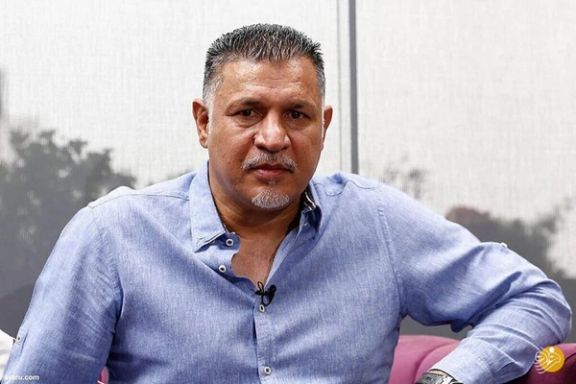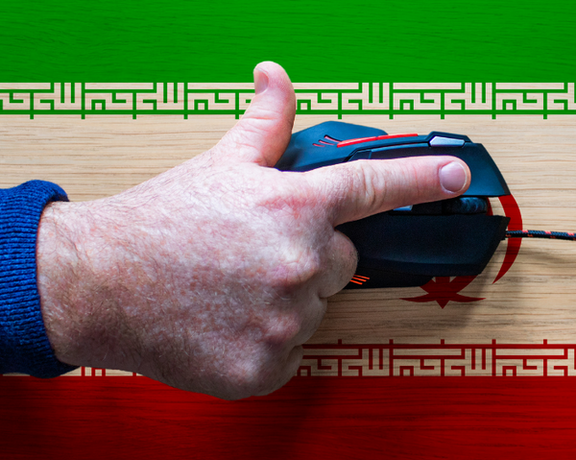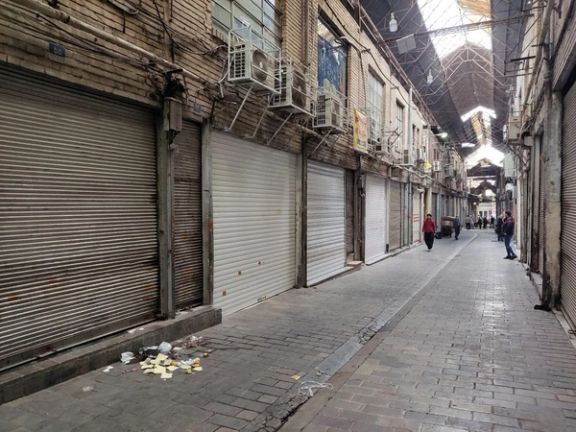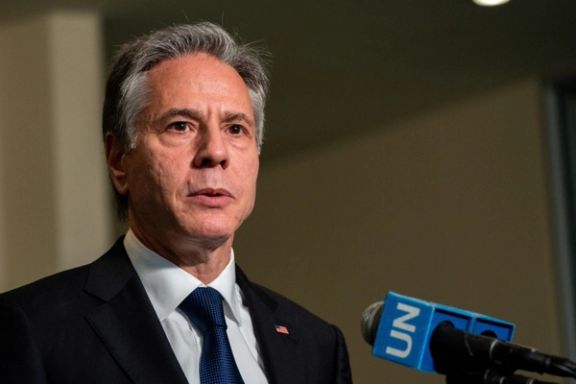Iranian Regime Seals Football Legend’s Business For Strikes Support

Security forces have reportedly sealed a jewelry shop and restaurant belonging to Iranian football legend Ali Daei after he shut down his businesses to join anti-government strikes.

Security forces have reportedly sealed a jewelry shop and restaurant belonging to Iranian football legend Ali Daei after he shut down his businesses to join anti-government strikes.
ISNA news agency reported Monday that the ex-footballer’s shop and restaurant in northern Tehran was shut upon official orders.
“Following the support for anti-government groups’ call on social media to disrupt peace and business of the market, a judicial order was issued to seal Noor Jewelry Gallery,” ISNA reported.
It also added that a restaurant belonging to Daei had also been ordered shut providing no further details.
Last week Daei revealed threats against him after throwing his weight behind the protests triggered by the death of Mahsa Amini in mid-September.
The nationwide protests in Iran have continued for 80 days with regime forces killing hundreds of people and detaining thousands of others, including football players and celebrities.
Earlier, Ali Daei decided not to travel to Qatar to attend the current World Cup due to the brutality and deadly force used by the government against unarmed protesters.
Many other legendary Iranian soccer players such as Mahdi Mahdavi-Kia, Karim Bagheri, Ahmad Reza Abedzadeh, etc., are supporting the protest movement.

Regime-backed hackers in Iran have targeted several activists, journalists, researchers, academics, diplomats and politicians, Human Rights Watch has said.
The rights watchdog said Monday that two of its staff members and at least 18 other high-profile activists have been targeted by a phishing campaign.
The email and other sensitive data of a correspondent for a major US newspaper, a women's rights defender in the Persian Gulf region and Nicholas Noe, an advocacy consultant for Refugees International based in Lebanon, have been compromised by APT42.
An investigation, launched by HRW and Amnesty International, revealed that the phishing attack was probably conducted by a group known as APT42 which is affiliated with the Iranian regime.
“Iran’s state-backed hackers are aggressively using sophisticated social engineering and credential harvesting tactics to access sensitive information and contacts held by Middle East-focused researchers and civil society groups,” stated Abir Ghattas, information security director at Human Rights Watch.
Ghattas further noted that it significantly increases the risks that journalists and human rights defenders face in Iran and elsewhere in the region.
The APT42 earlier targeted medical research companies in the United States and Israel in late 2020, and academics from France, and the Middle East in 2019.
They have also attacked the media sector and interfered with the presidential elections in the United States.

Iran's Chief Justice says death sentences of several protesters have been confirmed and they will be executed soon.
Gholam-Hossein Mohseni Ejei stated Monday that “rioters” will be promptly dealt with by the judiciary and security organizations. Ejei further went on to express that the protesters who have been condemned to death would soon be executed.
It is not clear whether prisoners whohave been formally sentenced would have any remaining right to appeal.
Iran’s use of the death penalty for protesters has been sharply criticized by the United Nations while some countries and many right groups have also condemned the move.
According to Amnesty International at least 28 inmates currently face execution for participation in the demonstrations, including three minors.
Meanwhile, the Revolutionary Guard released a statement to praise the judiciary’s decision urging it to decisively issue verdicts against “defendants accused of crimes against the security of the nation and Islam.”
“The country's security, intelligence, law enforcement and mobilization forces will not hesitate to deal decisively with rioters, thugs and the terrorists hired by the enemy,” Tasnim News Agency quoted the IRGC as saying.
Hardliners led by the IRGC call protesters “rioters” and “thugs”.
The threats by the Judiciary and the IRGC come amid nationwide strikes by workers and businesses to overthrow the clerical regime.
Many believe such remarks following the calls for three-day strikes and protests across the country are to scare the demonstrators to stop their movement to oust regime.

Anonymous underground grassroots groups formed across Iran during the past two months to organize antigovernment protests have joined hands for the same cause.
Until the call last week for three days of strikes and protests that began Monday, these young activists were serving as the unofficial leaders of movement, mobilizing thousands of people across the country through social media. But recently, the groups from at least 30 cities have formed an alliance.
The names of almost all these groups follow a simple formula adopted in the capital - Youth of Tehran Neighborhoods – or simply Tehran Youths (Javanan-e Tehran). Initially, this group was organizing rallies in Tehran and other cities and towns. Soon after, groups with similar names sprang up around the country and coordinated their announcements with the Tehran group.
The antigovernment protests in Iran often had no known leaders in the past five years, with all independent groups and political parties banned and disbanded long ago. Therefore, such grassroot groups seem to represent a new opposition force successfully issuing calls for demonstrations nationwide. The mobility of protesters and their distribution in various neighborhoods has now turned into a big problem for the security forces who are seen in some videos aimlessly running around to confront protesters and exhausting themselves even more after long hours of deployment.

These groups somewhat differ in tone and language visible in their statements, but they are unanimous in their goal to overthrow the Islamic Republic and all committed to their motto: Women, Life, Liberty. Some of these groups have issued about 20 statements so far but their first statement as a united front was released for the three-day action on December 5, 6, and 7. December 7 is Student Day in Iran and marks the anniversary of the 1953 murder of several students at University of Tehran. It is a traditional day of nationwide rallies. To coincide with Student Day, protesters are calling for strikes by businesses and a rally towards Tehran's Azadi (Freedom) Square, according to posts shared on Twitter.
In their statement, they called on all other groups who believe in "a democratic Iran with all its territorial integrity and based on universal human rights" to join them to help "overthrow the despotic Islamic regime.”
However, Iranian dissidents everywhere and outside these groups, although all support the underground activists. Numerous hacktivist groups and student groups have been fighting against the regime since the early days of the movement. In a recent move, Iranians have started using the Darknet, a shadow realm within the internet, to publish home addresses and cell phone numbers of members of Iran’s IRGC, its Basij militia and police forces who are oppressing and attacking protesters to enable the public to seek out revenge.
Israeli cyber intelligence firm Deep Void, whose founders have a background in Israeli intelligence, has revealed the phenomenon in which Iranian protesters are using the darknet to fight back against the regime’s agents, who during past protests could attack protesters and then disappear into anonymity.

Thousands of retail businesses in Iran went on a general strike Monday after underground activist groups called for three days of protests and market closures.
The three-day period started on Monday and will end on Wednesday. Nationwide protests are also expected to start Monday afternoon, while the authorities have run out of options to subdue the protesters, after resorting to deadly violence since mid-September.
Reports say businesses in over 40 cities across Iran are on strike with over 90 percent of retailers shutting their doors in a move that will be costly for the already beleaguered economy.
Tehran, Rasht, Karaj, Esfahan, Shiraz, Ardebil, Dezful are the main cities observing the shutdown to step up pressure on authorities.
Similar calls for strike action and mass mobilization in past weeks have strengthened the protest movement and led to a political crisis for the regime.
Workers at oil industry sector have also expressed support for the three-day call saying that all imprisoned workers, teachers, students must be released as soon as possible.
In universities, students have gone on strike to join the three-day movement that has called for the overthrow of the Islamic Republic.
Nearly 500 people have been killed in the unrest that erupted in September after the death in custody of Mahsa Amini, a 22-year-old woman who was detained by ‘morality police’ for breaking hijab rules.

US Secretary of State Antony Blinken says whatever happens in Iran has nothing to do with the United States and everything depends on Iranian’s will.
Blinken made the comments in an interview with the CNN following claims by Iran’s Attorney General Mohammad Jafar Montazeri who said Saturday that the controversial ‘morality police’ is “abolished”.
“It’s not about us. And what we’ve seen since the killing of Mahsa Amini has been the extraordinary courage of Iranian young people, especially women… standing up for the right to be able to say what they want to say, wear what they want to wear,” Blinken said.
Blinken also referred to Washington’s sanctions on those responsible for the crackdown on protesters in Iran.
“This is about people in [Iran] trying to express their views, trying to have their aspirations met, and the response that the governments are taking to that,” he said.
Iran’s Attorney General said Saturday that the “morality police” was disbanded, while there is no official confirmation, and many Iranians see the remark as a propaganda ploy.
In a separate Interview with CBS Blinken reacted to comments by Montazeri saying “if the regime has now responded in some fashion, to those protests, that could be a positive thing. But we have to see how it actually plays out in practice. And what the Iranian people think. This is about them, and it's up to them.”
The Attorney General's comments also seemed to be a temporary tactic to diminish the severity of protests ahead of the three-day nationwide protests and strikes which began on Monday.